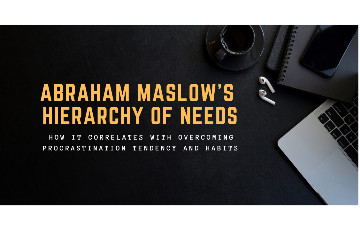
It is said that
“We procrastinate when we seek higher-level needs. But, to overcome procrastination, we have to acknowledge, address, and fulfill lower-level needs.” We procrastinate if we feel like we don’t meet a lofty standard of needs.
Abraham Maslow came up with 5 Hierarchy of Needs. An individual should move upward, starting from level 1. It is how one can minimize procrastination habits.
5 Hierarchies of Needs:
Level 1: Psychological Needs
This is the basic and first level an individual needs to function well. It includes life-essentials like food, water, clothing, shelter, home, sleep, etc. Maslow suggests that an individual has to fulfill this basic-need first to move to further levels.
Level 2: Safety Needs
When psychological needs are met, individuals move for safety needs like a friendly society, safe/secure environments in work and home, medical care, financial security, a sense of freedom to express themselves, emotional security.
Level 3: Social Needs
If L1 and L2 are met, individuals feel comfortable to move to social needs like friendship, trust, acceptance, affiliations, and look for emotional-comfort and belongingness.
Level 4: Esteem Needs
Esteem-needs cover all important aspects like skill-developing, earn reputation through work, independence, respect from others, and the like.
Level 5: Self-Actualization (Top Level)
The need to prove themselves, fulfill their potential, being creative, developing interest are different ways of self-expressing. The interest to do what they like, to follow their passion, pursue what they desire becomes prominent at this level.
What we infer here
Maslow suggests that “Procrastination will be “none to a minimum” in the lower-levels (since it covers necessities) than higher-levels (L4-L5)”.
Unless an individual address and fulfill L1-L3, they will be highly procrastinating in higher levels like L4-L5 which encloses your work, projects, education, business, etc.
Abraham Maslow's strategy of fulfilling needs plays a role in understanding the reasons for procrastination.


